Click on images to enlarge
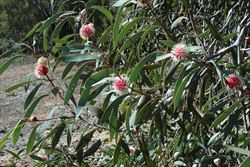
habit (Photo: Rob and Fiona Richardson)
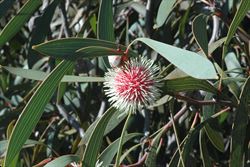
leaves and flower cluster (Photo: Rob and Fiona Richardson)
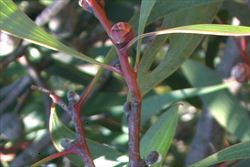
younger stem, leaf bases and young flower cluster (Photo: Rob and Fiona Richardson)
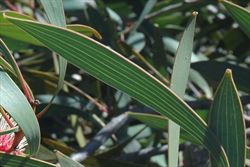
close-up of elongated leaf (Photo: Rob and Fiona Richardson)
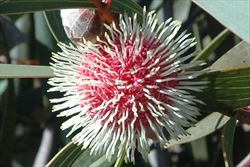
close-up of flowers (Photo: Rob and Fiona Richardson)
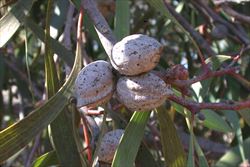
mature fruit (Photo: Rob and Fiona Richardson)
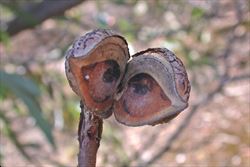
close-up of old fruit (Photo: Rob and Fiona Richardson)
Scientific Name
Hakea laurina R. Br.
Synonyms
Hakea eucalyptoides Meisn.
Family
Proteaceae
Common Names
emu bush, pin cushion hakea, pin-cushion hakea, pincushion hakea, pincushion plant
Origin
Native to south-western and southern Western Australia (i.e. from Wagin south to Denmark and east to Israelite Bay).
Naturalised Distribution
Naturalised in some parts of south-eastern Australia (i.e. in south-eastern South Australia, including on Kangaroo Island, and southern Victoria). Possibly also becoming naturalised outside its native range near Perth in south-western Western Australia.
Notes
Pincushion hakea (Hakea laurina) is regarded as an environmental weed in Victoria and South Australia. This species has escaped cultivation in south-eastern Australia and tends to rapidly invade natural habitats adjacent to where it is planted. It is especially aggressive in coastal situations and regenerates prolifically after burning. Its seeds are also stimulated to germinate by heat, and seedlings can be found in very high numbers after fires. Infestations of this species eventually smother indigenous vegetation and prevent the regeneration of locally native species.
Pincushion hakea (Hakea laurina) is a popular garden shrub in south-eastern South Australia. It is also listed as a common environmental weed of the Adelaide region and is also a known environmental weed in the nearby Mount Lofty Ranges. An infestation was present in Ferguson Conservation Park, in suburban Adelaide, but it is thought to have been eradicated. Pincushion hakea (Hakea laurina) is also naturalised in the Gippsland Plain Bioregion and present on numerous local environmental weed lists in southern Victoria (e.g. in Knox City, Frankston City, City of Hume, Surf Coast Shire and the Geelong Region).

